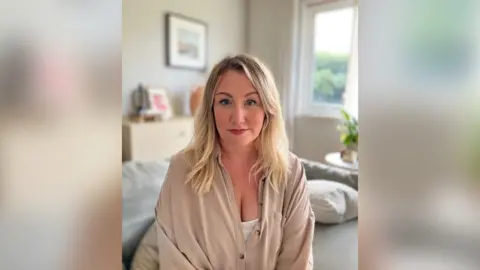Northumberland woman urges employers to help parents after baby loss
 BBC
BBCA woman who lost her baby during the coronavirus pandemic is writing a guide for employers about how to support staff with pregnancy loss.
Rebecca Charlton from Embleton, Northumberland, was five months pregnant when her waters broke and her son Jasper was too young to survive.
She said she was asked for a sick note, adding: "I'm not sick. I've just given birth, and my baby has died."
The government said it had commissioned new guidance on workplace bereavement.
Mothers who lose a baby before 24 weeks do not qualify for maternity leave and pay but are entitled to sick leave, statutory sick pay and should be able to get compassionate leave.
Mrs Charlton said she felt supported by her employer but wanted to write a guide to help managers and employees.
 Rebecca Charlton
Rebecca Charlton"It's a lot of unprocessed grief and very much an invisible thing," she said, adding: "But to somebody who's been through it, they have that child with them for the rest of their lives.
"We really need to look at how employers can support people through early pregnancy loss before 24 weeks and acknowledge the grief."
She said it was important for managers to know how to offer support after a 2021 survey found almost one in three women developed post-traumatic stress disorder (PTSD) after early pregnancy loss.
Mrs Charlton said: "I was really lucky with my manager who was a bit of a maverick and she made sure that the compassionate leave was there, but I still had to go and get a sick note two weeks after I'd held my baby in my arms and had to leave him at the hospital.
"But I'm not sick, my child's passed away and I've also given birth and the reason I'm not at work is because of that, it's awful."
 Family photo
Family photoThe Miscarriage Association launched a pregnancy loss pledge for employers to sign, acknowledging that they will support staff and "show flexibility" on leave where possible.
In 2020 the government introduced statutory parental bereavement pay and leave for women who have a stillbirth after 24 weeks of pregnancy.
A spokesperson for the Department for Business and Trade said: "We know miscarriages are an incredibly difficult and personal experience that will affect people differently.
"We have commissioned new guidance on managing bereavement in the workplace, including after miscarriage, and good employers will respond to requests from their employees in a sensitive way."
Mrs Charlton also wanted to encourage families who have been through a similar experience to open up and talk about what has happened.
When her family moved home and they were getting to know new people, she told them "I've got my daughter and I had my little boy, Jasper, but he passed away because he was born too soon".
She said: "It just took somebody to start that conversation and to make people think 'you're giving me permission so I'm going to talk to you about what happened to me'.
"It helps people to be able to talk about it, if they want to."

Follow BBC North East & Cumbria on Facebook, X (formerly Twitter), and Instagram. Send your story ideas to northeastandcumbria@bbc.co.uk.